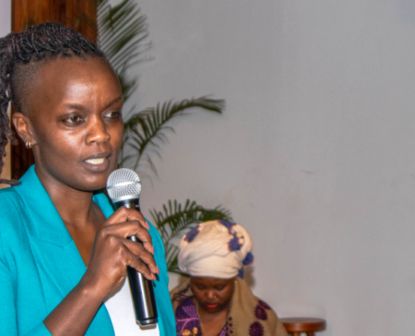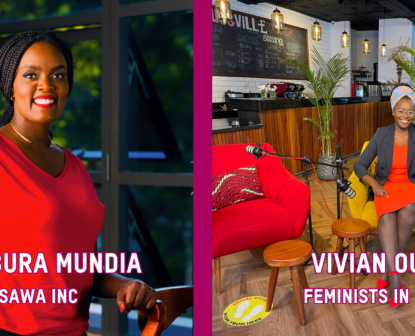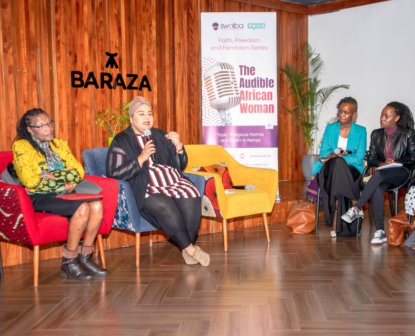Project
God Is Not A Man
-
Amount Funded
35,712 EUROProject Duration
01 May 2022 - 30 Jun 2024 -
-
Lead organisation
Usawa Inc
-
Usawa Inc. is an organization that works with women in their ecosystem towards co- creating equitable and decent workspaces, with the goal of improving women’s work experiences. So far Usawa Inc. through the Women Leaders Hangout has hosted 25 experts and up to 514 women in tackling inequalities at the workplace. As an additional strategy and to allow for more nuanced and unbridled conversations Usawa Inc. has developed a feminist podcast – Swaiba the Audible African Woman. Swaiba, challenges the notions of what it is to bea Black Young Woman by featuring young African women who are challenging patriarchal, racial,classist, sex and gender norms in their communities and work ecosystems.
Usawa Inc’s team is cognizant of the power and privilege we hold as a result of our education, experience and our identities. As a feminist founded organisation, we believe in dismantling bias, sharing power/ the transparent use of power, and practice accountable collaboration especially when we are working within formal grassroots organisations. We also provide and receive honest and respectful feedback especially while working with allies and LGBTQ communities. Our vision is to grow to sustainable feminist organisation that is able to leverage feminist movement power and expertise to challenge inequalities at the workplace, violence against women/sexual and gender minorities and their limited participation in politics and leadership. We also aim to grow our capacity in creating, publishing and distributing feminist content, by growing Swaiba to a feminist media lab. We are looking into growing the Women Leaders Hangout to a space that holds duty bearers to account for their implementation on women /social-political rights nationally, but also offers women a space for community self-care, innovation and co-creating feminist futures.
-
Organisation
Usawa Inc. is an organization that works with women in their ecosystem towards co- creating equitable and decent workspaces, with the goal of improving women’s work experiences. So far Usawa Inc. through the Women Leaders Hangout has hosted 25 experts and up to 514 women in tackling inequalities at the workplace. As an additional strategy and to allow for more nuanced and unbridled conversations Usawa Inc. has developed a feminist podcast – Swaiba the Audible African Woman. Swaiba, challenges the notions of what it is to bea Black Young Woman by featuring young African women who are challenging patriarchal, racial,classist, sex and gender norms in their communities and work ecosystems.
Usawa Inc’s team is cognizant of the power and privilege we hold as a result of our education, experience and our identities. As a feminist founded organisation, we believe in dismantling bias, sharing power/ the transparent use of power, and practice accountable collaboration especially when we are working within formal grassroots organisations. We also provide and receive honest and respectful feedback especially while working with allies and LGBTQ communities. Our vision is to grow to sustainable feminist organisation that is able to leverage feminist movement power and expertise to challenge inequalities at the workplace, violence against women/sexual and gender minorities and their limited participation in politics and leadership. We also aim to grow our capacity in creating, publishing and distributing feminist content, by growing Swaiba to a feminist media lab. We are looking into growing the Women Leaders Hangout to a space that holds duty bearers to account for their implementation on women /social-political rights nationally, but also offers women a space for community self-care, innovation and co-creating feminist futures.
-
Project
The change we want to see is the transformation of social norms that fuel SGBV and political exclusion of women and sexual and gender minorities, in favour of norms that promote gender equality, tolerance of diversity and the realisation of human rights of women and sexual and gender minorities in all spheres. We seek to Amplify the voices of Islamic and Christian feminists who are upending biased historical and exegetical methodologies of interpreting the holy scriptures that fuel oppressive norms, promote progressive cultural and religious norms as a result of localised cooperation, Interfaith Circles, that offer safe spaces to discuss faith and cultures that shape the realities of women, gender and sexual minorities, Increase the number of cleric and lay leaders willing to consider feminist approaches to the interpretation of scripture and cultural logic Encourage collaboration between mainstream feminists and religious feminists. We will create a podcast that will be a learning resource on religion and feminism, that can be integrated into local contexts and that can facilitate intersectional, crosscutting learning. Our solution is innovative because it creates interfaith spaces for public discourse which are rare across the continent, it attempts to bridge gaps between religious, non-religious, urban and grassroots feminists and finally, it uses digital storytelling as a tool for social norm change.
Initiating collaboration between allies, religious feminists and mainstream feminists will increase interface between and amongst the groups, thereby reducing stigma and exclusion of faith feminists and allies. Additionally reframing public theological discourses to include feminist approaches to the interpretation of holy texts, amongst communities will mitigate SGBV and social political oppression of women, sexual and gender minorities. Through our work in producing feminist podcast content we recognise the power of digital storytelling to shift social norms, change attitudes and beliefs. We are keen to interrogate how we can engage diverse audiences (urban and in informal settlements) by collaborating with mainstream media and production houses to publish and distribute feminist content to centre feminist approaches in current affairs and public discourses.
-
-
The change we want to see is the transformation of social norms that fuel SGBV and political exclusion of women and sexual and gender minorities, in favour of norms that promote gender equality, tolerance of diversity and the realisation of human rights of women and sexual and gender minorities in all spheres. We seek to Amplify the voices of Islamic and Christian feminists who are upending biased historical and exegetical methodologies of interpreting the holy scriptures that fuel oppressive norms, promote progressive cultural and religious norms as a result of localised cooperation, Interfaith Circles, that offer safe spaces to discuss faith and cultures that shape the realities of women, gender and sexual minorities, Increase the number of cleric and lay leaders willing to consider feminist approaches to the interpretation of scripture and cultural logic Encourage collaboration between mainstream feminists and religious feminists. We will create a podcast that will be a learning resource on religion and feminism, that can be integrated into local contexts and that can facilitate intersectional, crosscutting learning. Our solution is innovative because it creates interfaith spaces for public discourse which are rare across the continent, it attempts to bridge gaps between religious, non-religious, urban and grassroots feminists and finally, it uses digital storytelling as a tool for social norm change.
Initiating collaboration between allies, religious feminists and mainstream feminists will increase interface between and amongst the groups, thereby reducing stigma and exclusion of faith feminists and allies. Additionally reframing public theological discourses to include feminist approaches to the interpretation of holy texts, amongst communities will mitigate SGBV and social political oppression of women, sexual and gender minorities. Through our work in producing feminist podcast content we recognise the power of digital storytelling to shift social norms, change attitudes and beliefs. We are keen to interrogate how we can engage diverse audiences (urban and in informal settlements) by collaborating with mainstream media and production houses to publish and distribute feminist content to centre feminist approaches in current affairs and public discourses.
-
Introduction
Usawa Inc. launched an interfaith podcast series to challenge the misuse of holy texts that
justify violence against women and gender minorities. The project created a safe space for
dialogue among religious leaders, feminists, and scholars, empowering communities to
transform harmful cultural norms. The podcast, featuring voices like Sheikh Lithome from the
National Muslim Leaders Forum, aimed to amplify feminist interpretations of scripture and
promote collaboration between mainstream and religious feminists.The project was implemented through a multi-pronged strategy:
1. Podcast Series: Usawa Inc. through developed a bold interfaith podcast featuring debates
among Kenyan clerics, African feminist influencers, and academics. This series of 10 episodes
facilitated critical discussions on the interpretation of holy texts, focusing on how these texts
have been used to justify violence and oppression against women and gender minorities.
Sheikh Lithome and Prof Mombo, a respected religious figure, and a scholar respecricely were
among the key contributor, offering a progressive Islamic perspective.
2: Physical Safe Spaces: Usawa Inc. created interfaith Learning Circles within Mathare, Kibera
and Mukuru communities, providing physical safe spaces for dialogue. These circles
empowered upto 400 women directly towards addressing microcultural and religious norms
that promote violence, amplifying the voices of community feminists and fostering mutual
support.
4. Community Partners Engagement: We partnered with organisations such as GALCK+ and
KESWA to disrupt local narratives contributing to violence against women and gender
minorities. These programs were designed to be accessible, ensuring the message reached
even the most remote communities.Impact and Transformation
The project significantly impacted participants and the broader community:
1. Amplified Feminist Voices: The podcast amplified the voices of Islamic and Christian
feminists challenging biased interpretations of scripture, advocating for gender justice within
their communities with upto 13,000 Views on Youtube.
2. Cultural and Religious Norms Shift: The 20 interfaith learning circles led to progressive
shifts in microcultural and religious norms, empowering individuals to question and transform
longstanding practices.
3. Increased Cleric Engagement:A growing number of clerics and lay leaders are now
considering feminist approaches to scripture interpretation.
4. Collaboration Between Feminist Movements: The project fostered greater collaboration
between mainstream and religious feminists, creating a unified front against systemic
oppression.Conclusion:
Usawa Inc. envisions a future where feminist approaches to scripture interpretation are widely
accepted within religious communities. Through the work with Voice, Swaiba was contracted
by the Council of World Mission for a series on Queer Theologies in Harare and in London -
News





